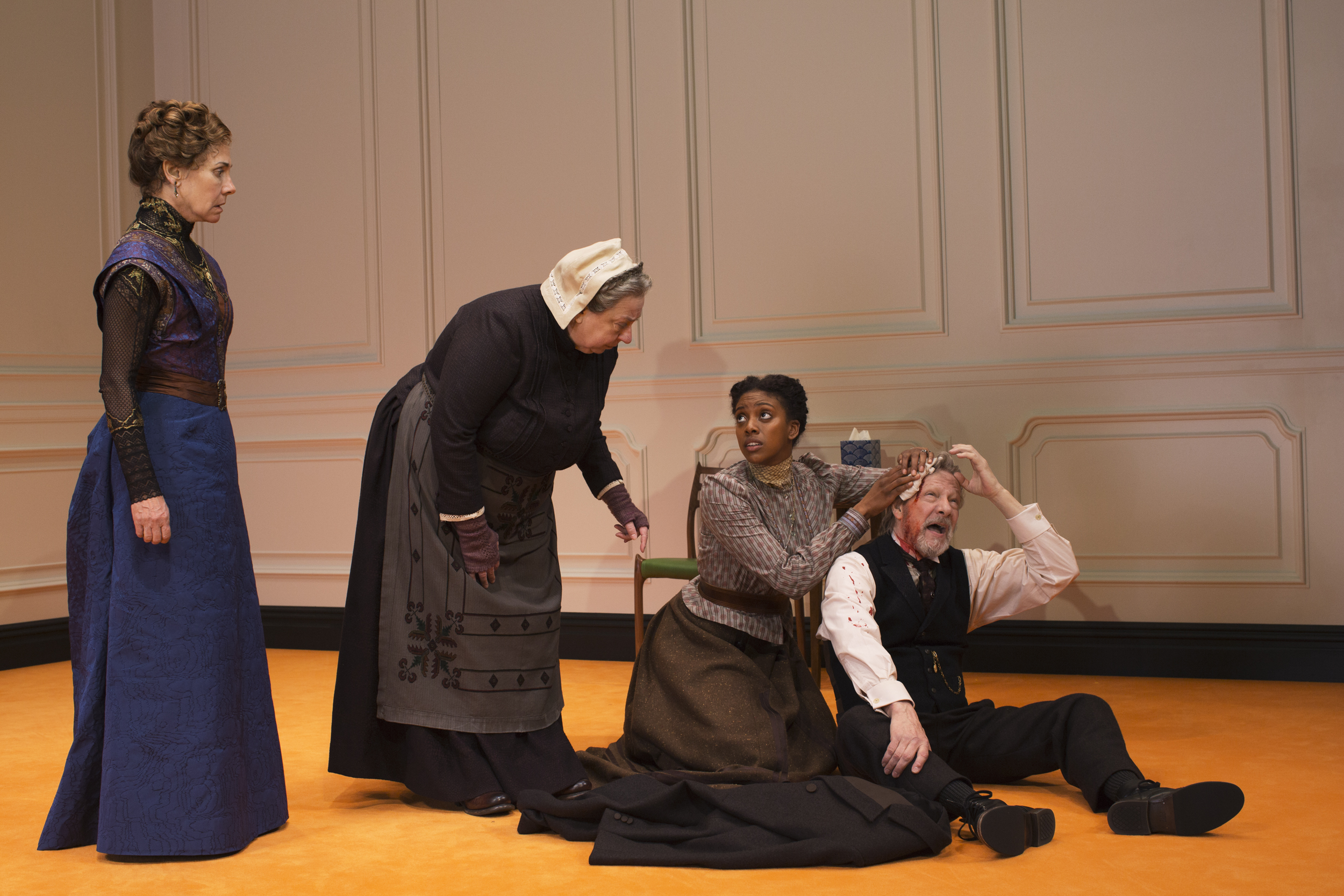A Doll's House Part 2

Laurie Metcalf, Jayne Houdyshell, Condola Rashad, Chris Cooper (photo by Brigitte Lacombe from DKC/O&M)
The scene opens on a large room, empty except for four contemporary Scandanavian chairs, a side table, and a potted plant, with an imposing black door on the back wall. Since this is A Doll’s House, Part 2, you recognize that as the door Nora exited through at the end of Henrik Ibsen’s classic 1879 drama, A Doll’s House. In a moment Nora, in the person of Laurie Metcalf, will reenter through that door, setting into motion Lucas Hnath’s exciting and throught-provoking play.
It’s now 15 years later, and Nora, who left behind her husband Torvald and three young children, has found a prosperous life as the pseudonymous writer of popular feminist novels. However, it turns out that she and Torvald never officially divorced, posing a threat to all she’s accomplished. Now she’s returned, hoping to convince Torvald to file for divorce, since it’s much easier for a husband than a wife to do.
Although she’s dressed in a stylish 19th century costume, this is a thoroughly modern Nora, who speaks in contemporary, sometimes vulgar vernacular. Portrayed by Laurie Metcalf, a founding member of Chicago’s legendary Steppenwolf Theatre Company, she is supremely self-confident, railing that “marriage is cruel and destroys women’s lives.” Metcalf also uses the comedienne’s gifts she honed as Roseanne Barr’s sister on TV in this play, which is a lot funnier than Ibsen – like her bold prediction that marriage as an institution “will end in 20 or 30 years!”
While Metcalf is clearly the star of A Doll’s House, Part 2, each member of the four-person cast is equally talented. Jayne Houdyshell, an always-reliable Broadway veteran who won a Tony last year for The Humans, plays Ann Marie, the faithful nanny. Nora counts on her to be an ally, not expecting the pushback she gets from Ann Marie, who left her own child to raise Nora’s three.
As embodied by Chris Cooper, an Academy Award winner for Adaptation, Torvald is an old-school but sympathetic character. True, he never really understood Nora, but didn’t she use him? “The same way I made assumptions about you, you made assumptions about me.”
Nora’s myopia also comes into focus when facing her youngest child, Emmy, now a poised grownup played by the Tony-nominated actress Condola Rashad. While Nora prides herself on being a new woman with no need for marriage, Emmy is more traditional and sees nothing wrong with committing to life with another person.
A sequel to a classic risks feeling gimmicky but not A Doll’s House, Part 2. The plot builds logically on Ibsen’s, and Hnath’s script allows you to see each character’s point of view. There is anger, resentment, humor, and, ultimately, sadness, along with enormous eloquence. Sam Gold, who directed the Tony-winning musical Fun Home and this year’s revival of The Glass Menagerie, brings out the best in his actors, but I’m not sure we need anachronistic touches like a box of Kleenex and Nora’s swigging a bottle of water to remind us that the issues the play raises are still relevant.
Nora needed to find herself – and she did – but was it worth abandoning her children to do it? As Torvald points out, “The moment you brought up our problems you walked out.” Now older and perhaps wiser, he yearns for a relationship where two people work through problems, but not Nora. She may be too self-absorbed to ever be happy in a marriage. This no Shakespearean taming of the shrew. The tragedy is that a woman of her time didn’t have many options. But if there was ever a case of “irreconcilable differences,” this is it. A Doll’s House, Part 2, at the Golden Theatre on Broadway.

